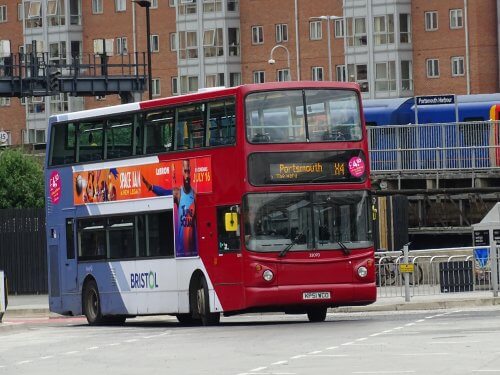
The Government has outlined its plans for the final phase of Covid-19 support funding for the bus industry, which will run until April 2022
Bus operators across the country will benefit from £226.5 million in Government funding to help ensure they continue to run services as Covid-19 restrictions are lifted, Roads Minister Baroness Vere announced on Tuesday 6 July. The funding will run from September 2021 to April 2022 and will support English operators outside London, as part of the Government’s pledge to level up transport links as passenger numbers begin to return to pre-pandemic levels. The Department for Transport (DfT) has also announced that it has received 35 Expression of Interest applications for the Zero Emission Bus Regional Areas (ZEBRA) scheme, which gives local transport authorities the opportunity to compete for a share of £120 million to support the roll-out of zero-emission buses across England.
Baroness Vere said: “Buses are the lifeblood of our communities, helping us get to work, school and to see friends and family. The recovery funding will ensure vital services continue to run by supporting operators in those initial months, as restrictions are lifted
and passengers begin to return in higher numbers. And as we build back greener from the pandemic, the £120 million to roll out zero-emission buses will have a profoundly positive effect on our towns and cities, lowering emissions, improving air quality and reducing noise pollution.”
The recovery funding will follow the current emergency support package, which is due to end next month after providing more than £1 billion to keep services running throughout the pandemic, and will be provided on a formula basis, ensuring the sector can begin to return to operating on a commercial footing. The funding will be the final tranche of Covid-19-related support provided to the sector. The recovery funding will also support the key aims of the National Bus Strategy of encouraging local authorities and operators to work together to deliver better bus services.
The ZEBRA fund was launched in March this year with local transport authorities able to apply under either a fast track or standard process. Local transport authorities selected under the fast track process to progress to the next stage of the competition are: Cambridgeshire and Peterborough Combined Authority; Kent County Council; Leicester City Council; Milton Keynes Borough Council; Warrington Borough Council, and; West Midlands Combined Authority.
The six shortlisted authorities will now develop business cases for investment, with the Government awarding the first tranche of ZEBRA funding to authorities that produce the strongest business cases. More local transport authorities will be announced as being selected to produce business cases under the standard process in due course. The ZEBRA funding is part of the wider £3 billion fund announced to improve bus services in the National Bus Strategy.
Response
The announcement was welcomed across the industry. Go-Ahead CEO David Brown said: “The support we have received from Government over the last 16 months has enabled us to continue to provide vital services to communities, including essential journeys during the various lockdowns. Passenger numbers are now around 65% of pre-Covid levels. We look forward to welcoming more customers on our services as restrictions end, helping support economic recovery, reducing emissions and revitalising our towns and cities.
“The National Bus Strategy provides a framework for bus journeys to become quicker, more reliable and convenient. We will continue to work in partnership with local authorities to develop our services and make it easier for people to choose the bus and leave their cars at home.”
Stagecoach Chief Executive Martin Griffiths commented: “We welcome the UK Government’s continued commitment in recognising the importance of bus in the recovery from the pandemic. As it makes plans to ease restrictions further, there has never been a better time for us to maximise the potential of the bus. Buses are central to driving the country’s recovery, helping to rebuild our regional economies, reconnecting people and their families, as well as supporting the country’s long-term objectives around decarbonisation, improved air quality and better health. The new National Bus Strategy for England provides a great opportunity to transform travel in our communities, whilst ensuring that customer needs remain at the core of our networks.”
First Bus Managing Director Janette Bell also welcomed the news: “We welcome today’s announcement by UK Government of a bus recovery funding package for England which will ensure that an effective bus network can be provided for customers as the economy and the communities we serve emerge from the pandemic. We will continue to build on the successful partnerships we have created with local authorities to meet our customers’ needs by developing joint plans for further improvements and innovation over the coming months. It is vital that Government continues to work together with us to encourage more people onto buses in order to deliver economic revival, improve air quality and meet the UK’s net zero ambitions.”
The CPT issued a statement calling for a close working relationship between the Government and the industry: “Today’s announcement recognises the crucial role buses will play in the country’s recovery from Covid-19. Operators will be working with local authorities to ensure the services passengers need are in place as restrictions end and new travel patterns begin to emerge. This will be an integral part of our joint working on bold bus service improvement plans that put buses at the heart of transport networks to maximise the potential of the National Bus Strategy for communities across the country. With the Government’s mixed messaging on face coverings likely to cause confusion for passengers we now need to see the Government working with industry to loudly back a return to bus to help the economic recovery in our towns and cities and ensure the country remains on track to meet its ambitious climate change and air quality goals.”

